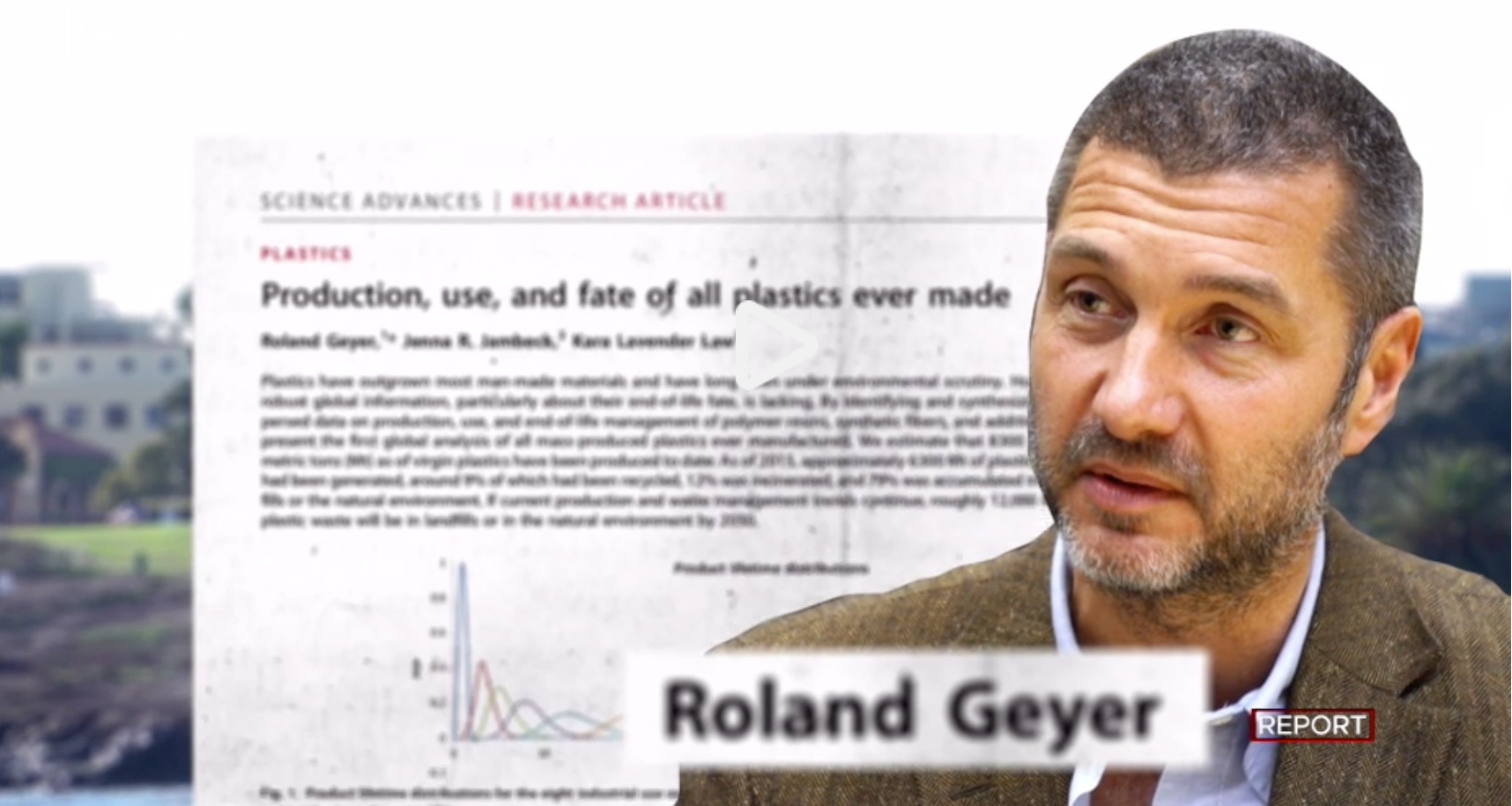In the News
Click on the links below to jump to a specific subject
Plastic Pollution — Circular Economy Rebound — No Such Thing as a Green Product — Sun-to-Wheels
PLASTIC POLLUTION
Roland Geyer Looks to Rewrite the Book on Plastics
August 14, 2019
The Santa Barbara Independent features Roland and his work on how to make a real dent in plastic pollution. Source reduction must be part of the solution.
Guardian Comic
Accounting for humanity’s legacy
June 24, 2019
Until recently we didn’t know how much plastic was piling up around us. When we found out, the picture wasn’t pretty. Susie Cagle illustrates Roland in his story of where our plastic goes. Click the image to access the full cartoon.
Rai 3 Report
Ci siamo imballati
June 16, 2019
Italy’s Rai 3 covered the issue of plastic pollution in its latest segment of Report and came to Santa Barbara to sit down with Roland and discuss the scale of the issue.
Dovevamo ridurre, riutilizzare e riciclare!
Cleaning up the Plastic in the Ocean
January 3, 2019
Roland was on 60 minutes talking about plastics pollution, recycling and the future of recycling trade.
Plastic lasts more than a lifetime, and that’s the problem
September 25, 2018
What happens to all of the plastic we are making? PBS News Hour sits down with Roland to discuss the answer from his research.
CBS Sunday Morning
Piling up: Drowning in a Sea of Plastic
August 5, 2018
Roland talks to CBS Sunday Morning about plastic use and how long plastic takes to break down.
Research finds 8.3B metric tons of plastic has been produced since 1950
August 7, 2017
CGTN focuses on Roland’s work quantifying plastic production volumes and flows of plastic to the ocean. Stating that plastic is piling up at an accelerating rate
CIRCULAR ECONOMY REBOUND
Will the circular economy save the planet?
An in-depth review and critique of the circular economy by sustainable apparel expert Elizabeth L. Cline, featuring Roland and his work with Trevor Zink on circular economy rebound.
Circular economy isn't a magical fix for our environmental woes
Solving our ecological crises means diluting the power of global corporations – not propping them up
With his former PhD student, Trevor Zink, Roland Geyer coauthored a paper that was awarded 2017 Journal of Industrial Ecology Best Paper
The work, Circular economy rebound published in the Journal of Industrial Ecology, was praised for its original content, engaging writing and excellent figures. The authors use conceptual ideas, literature review and two simple, but elegant, equations to demonstrate an important rebound effect affecting the efficacy of the circular economy.
Trevor Zink and Roland Geyer coauthor an impactful article challenging
the notion that sustainability means selling and buying “green” products
“Roland Geyer of the University of California, Santa Barbara, and Trevor Zink of Loyola Marymount University argue that comparing products to some arbitrary “benchmark” in order to determine whether or not they’re eco-friendly is causing us to not only lose sight of what eco-friendly really means, but also — in some cases — to support products that actually have an overall negative impact on the environment.”
- Grist, March 3, 2016
“Is There Really Such a Thing as a Green Product? A new article by University of California-Santa Barbara professor Roland Geyer and Loyola Marymount University professor Trevor Zink explores this issue in depth. Geyer is a professor of industrial ecology and green supply chain management, while Zink is a professor of sustainability and corporate social responsibility.”
- iSustainableEarth.com, March 22, 2016
Is solar power a more efficient automotive fuel than biofuels? Geyer et al. 2013 conducted a spatially explicit LCA to find the best way of harvesting sunlight
“Spatially explicit life cycle assessment of 5 sun-to-wheels pathways finds photovoltaic electricity and BEVs offer land-efficient and low-carbon transportation”
- Green Car Congress, January 4, 2013
"What it says to me is that by continuing to throw money at biofuels, we're barking up the wrong tree," Geyer explains. "That's because of a fundamental constraint, which is the relative inefficiency of photosynthesis. And we can't say that right now, biofuels aren't so great but they'll be better in five years. That fundamental problem for biofuels will not go away, while solar EVs will just continue to get more efficient and cheaper. If they're already looking better than biofuels, in five years the gap will be even greater. A search for a silver bullet is under way through "synthetic photosynthesis," but using genetic engineering to improve the efficiency of photosynthesis is a pipe dream. If there is a silver bullet in energy, I think it's solar power."
- Dr. Geyer in Science Daily, January 17, 2013




























